Report to Parliament 2016-2023
Download as PDF (774 KB)
- His Majesty the King in Right of Canada, as represented by the Minister of the Treasury Board, 2023
- Catalogue No.: SC103-31/2024E-PDF
- ISSN: 978-0-660-70163-9
Table of Contents
Message from the President
As President of the Canada School of Public Service (the School), I am pleased to report on the activities of the School for the period December 1, 2016, to November 30, 2023, in fulfillment of subsection 19(3) of the Canada School of Public Service Act. This report highlights how the School evolved over the course of this period and renewed its commitment to offering timely and relevant learning opportunities to federal public servants across Canada.
Upon joining the School in July 2018, I made it my mission for this organization to play an increasingly important and relevant role in the public service. Focus was put on ensuring the excellence and relevancy of the School's learning products to meet the ever-evolving needs of the Government of Canada. To this end, the organization adopted five business lines to better develop and deliver learning in support of the Government of Canada's priorities, and meet individual and departmental learning needs.
I am pleased with the progress the School made during this period, including its positive impact on the public service. I believe it is well positioned to provide the learning products and tools needed to help public servants succeed going forward.
Taki Sarantakis
President, Canada School of Public Service
Introduction
The Canada School of Public Service (the School) has changed considerably since its last Report to Parliament. This new era of learning for federal public servants has been marked by:
- Enhanced offerings;
- Improved learner experiences with digital and on-demand options;
- Innovation in course delivery and through cross-departmental collaboration; and
- Greater business efficiencies enabled by organizational restructuring and modern business practices.
The COVID-19 pandemic posed challenges prompting further organizational innovation and agility in recent years. In 2020, in-person learning pivoted to virtual instructor-led training (VILT), ensuring public servants had the knowledge and skills needed to carry out government operations in an entirely new and largely online operating context. This shift resulted in more learners accessing online events and materials, as well as facilitated more collaboration with experts around the world.
Moving into the future, the School will continue to evolve in how it provides learning activities that build individual and organizational capacity as well as management excellence within the Government of Canada.
About
The School is a departmental corporation under the Treasury Board portfolio that functions like a corporate training and development institution for federal public servants. It supports common learning for public servants nationwide and at all levels to equip them with the knowledge, skills and competencies needed to excel in their service to Canadians.
Under the Canada School of Public Service Act, the School's mandate is to:
- Encourage pride and excellence in the public service
- Foster a common sense of the purposes, values and traditions of the public service
- Support the growth and development of public servants
- Help ensure that public servants have the knowledge, skills, and competencies they need to do their jobs effectively
- Assist deputy heads in meeting the learning needs of their organization
- Pursue excellence in public management
To fulfill this mandate, high-quality courses, learning tools, and informative events are provided to public servants across over 90 federal departments and agencies across the country.
Where we have been
Since the last report to Parliament, the organization's structure has changed to create a more effective and modernized learning environment for public servants. These changes began in 2014 with a shift away from:
- Decentralized (varied) programming;
- In-person delivery across the regions; and,
- A cost-recovery model.
Concurrently, the goal was to move toward a technology-enabled, whole-of-government approach to learning delivery, which would result in:
- Easier access to learning materials for public servants across Canada;
- Organizational stability for the School via an appropriations-based funding model, and;
- Greater consistency in learning offerings across the regions.
To enable our success, changes to the organization's structure, funding model, business practices, and platform have enhanced curricular coherence and innovation, enabled efficiencies, and have created more accessible and customizable experiences for learners.
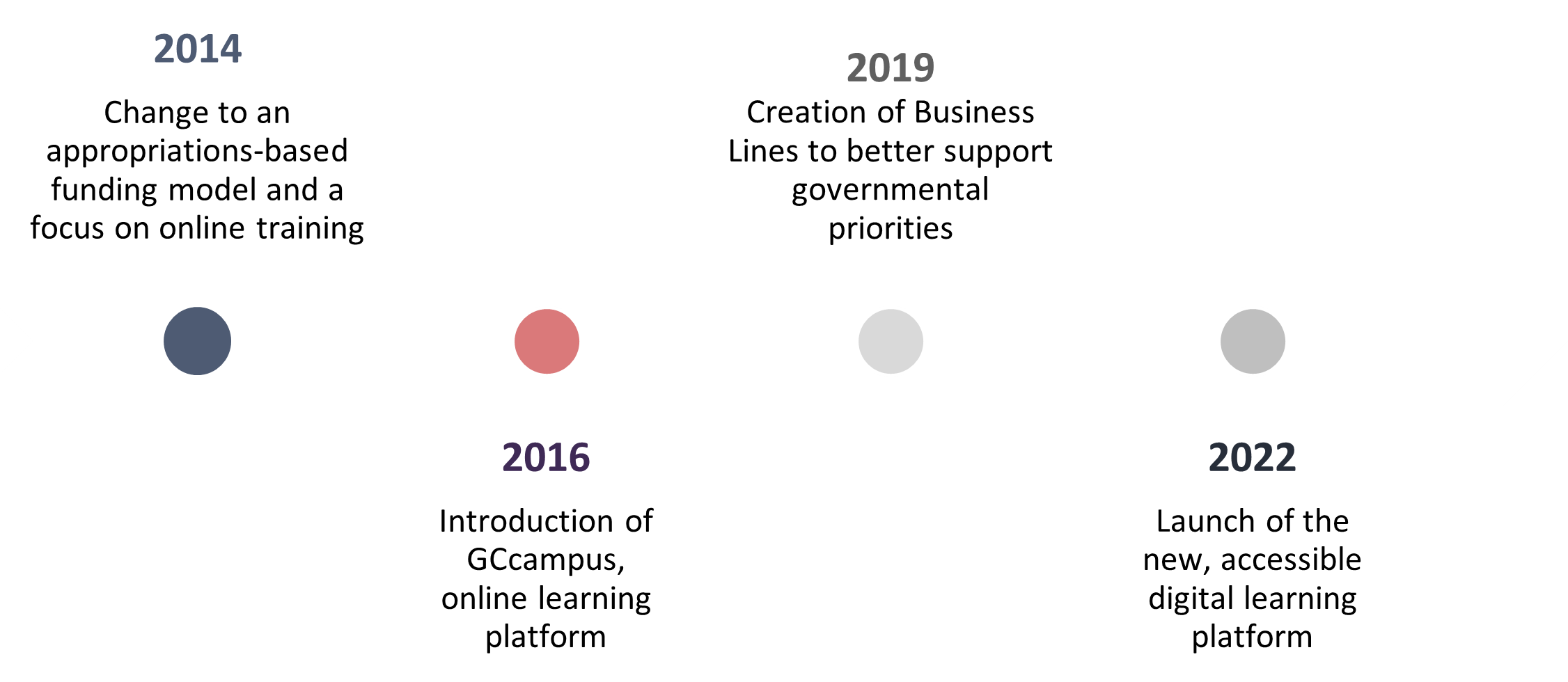
Text version
Figure 1 presents a timeline of key organizational initiatives from 2014 to 2023. In 2014, there was a change to an appropriations-based funding model and a greater focus on online training. In 2016, the School introduced the use of GCcampus, an online learning platform. In 2019, the School reorganized around Business Lines to better support governmental priorities. In 2022, the School launched the new, accessible digital learning platform.
Where we are today
Designed for enduring and emerging needs: The Business Lines
In 2019, the School transitioned from learning that focused on the learner's career stage to an organizational model that could better address government priorities as well as the enduring and emerging learning needs required for a high-performing public service. This redesign resulted in the creation of five business lines within the School.
Government of Canada and Public Sector Skills: designs online and instructor-led programs for public servants at all stages of their careers, including new employees, functional specialists and employees transitioning to managerial positions. The Treasury Board of Canada Secretariat and certain departments consider many of these learning products as mandatory learning for employees, including courses required for certification of specialists.
Transferable Skills: designs learning content that provides public servants with portable skills and mindsets that are relevant inside, outside and across government.
Respectful and Inclusive Workplace: produces learning content aimed at developing the knowledge, skills and competencies that leads to more inclusive workplaces and mindfulness of the impact of programs, policies and decisions on diverse groups of people. Learning is designed based on the core principle "Nothing about us, without us" in collaboration with interdepartmental working groups and advisory committees, subject-matter experts, and public servants with lived experience.
Indigenous Learning: advances reconciliation in Canada by educating public servants about the history, cultures, perspectives and current realities of First Nations, Inuit, and Métis, including their long-standing relationships with the Crown.
Digital Academy: equips public servants with the knowledge, skills, and practical experience needed by government in the digital age. The Digital Academy's programming is designed to help public servants in their day-to-day work and includes digital, data, design, cybersecurity, cloud, and product management. It helps the Government of Canada realize its strategic and policy direction in the digital space.
Directorates for targeted learning
Three directorates provide targeted learning to strengthen public servants' knowledge and competencies in a few key areas.
Executive Learning: supports leaders in mobilizing a world-class public service that is agile, equipped, and inclusive by enhancing their skills and competencies throughout their careers. This directorate delivers transition-to-role programming to strengthen understanding of expectations at-level and enhance key leadership capabilities. It collaborates with the School's business lines to develop targeted executive-exclusive learning products on multiple topics. Between September 2020 and November 2021, the directorate organized 156 learning sessions for Executive Leadership Development Program cohorts, in addition to other learning activities such as mentoring and action learning.
Policy, Priorities and Partnerships: provides a range of services that are intended to introduce public servants to the latest thinking, practices and tools related to public sector management, policy work, geopolitics and national security via applied policy work partnerships, advisory services, specialized courses, and events.
Public Sector Innovation: develops and enables innovative approaches to public sector challenges in partnership with departments and agencies. This work includes experimenting with and applying technological innovations to create an interactive and impactful learning experience, and delivering learning events that inspire innovative thinking.
Key strategies of how we work today
Along with an improved organizational structure, the School has modernized approaches to learning using three key strategies:
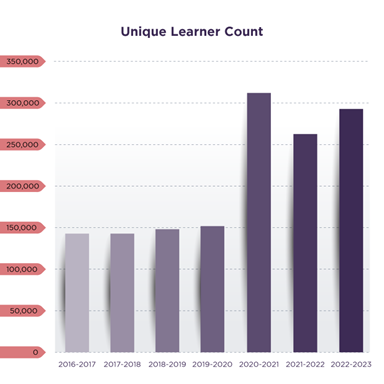
Text version
A bar graph shows the increase of unique learners served from 2016 to 2023 as the School increased its online self-paced course offerings. From 2016 to 2017, there were 142,109 unique learners. From 2017 to 2018, there were 141,211. From 2018 to 2019, there were 147,661. From 2019 to 2020, there were 156,384. From 2020 to 2021, there were 312,364. From 2021 to 2022, there were 267,456. Lastly, from 2022 to 2023, there were 286,756 unique learners."
- A digital-first approach
- Learning by doing
- Content excellence
A digital-first approach
The digital-first approach to learning improves access to content for public servants across the country while also reducing delivery costs. These improvements began in 2016 with the launch of GCcampus, an online learning platform replacement for the previously used CampusDirect. GCcampus updated the interface used for browsing the learning catalogue and course registration, as well as enabled an increased delivery of webcast events.
With an increase in online self-paced course offerings for learners, there was a notable increase in the number of unique learners served and course enrollments since 2016–17Note*. More unique learners online proportionally affected the number of registrations to use learning products. There was a steady increase in registrations for online self-paced courses followed by a stabilization of registrations at double the pre-pandemic level once a hybrid working model was in place.
The new learning platform
The new learning platform was implemented in 2022 to further improve users' online learning experiences, comply with the Government of Canada's digital and accessibility standards, and to host an increasing number of courses and events.
The new learning platform improves the learning and registration experience for all public servants, with advantages such as:
- An easier login system—learners can sign in using their GC email address
- A user-friendly, accessible, secure, reliable, cloud-based platform with a scalable learning experience – the first of its kind deployed in the federal public service
- A new integrated learning catalogue with enhanced search and filter functions
- Access to a personalized learning space where users can update their profiles, identify their language preferences, and view their learning activities
To facilitate this transition, in advance of the implementation of the new platform, a curriculum review took place in line with a focus on the user's experience and to ensure that content and courses were accurate, relevant, converted to virtual delivery methods, and reflective of priorities, changes in policy, and feedback from users. Additionally, all course descriptions were reviewed, modified, and standardized. These actions ensured that course descriptions were consistent and clear, thereby improving the learners' ability to find relevant learning products.
Mobile-first options were developed to ensure learners could access content on-the-go or using mobile devices of their choice, further expanding options for how and when public servants can learn. Taken together, the new platform and mobile-first options provide the modern, flexible digital learning environment needed to serve public servants well wherever they are or however they choose to access our content.
Lastly, multitenancy was advanced to provide other government departments (OGDs) access to the learning platform, increasing efficiencies and leveraging experience. Flexible models of multitenancy allow OGDs to choose their desired level of involvement in setting up and managing course content. For an example of courses made available through multitenancy, see Applying Climate Literacy Foundations, Contributing to a Net-Zero Canada, and Adapting to Changing Climate in Canada delivered and maintained by Environment and Climate Change Canada.
Impacts of the COVID-19 pandemic
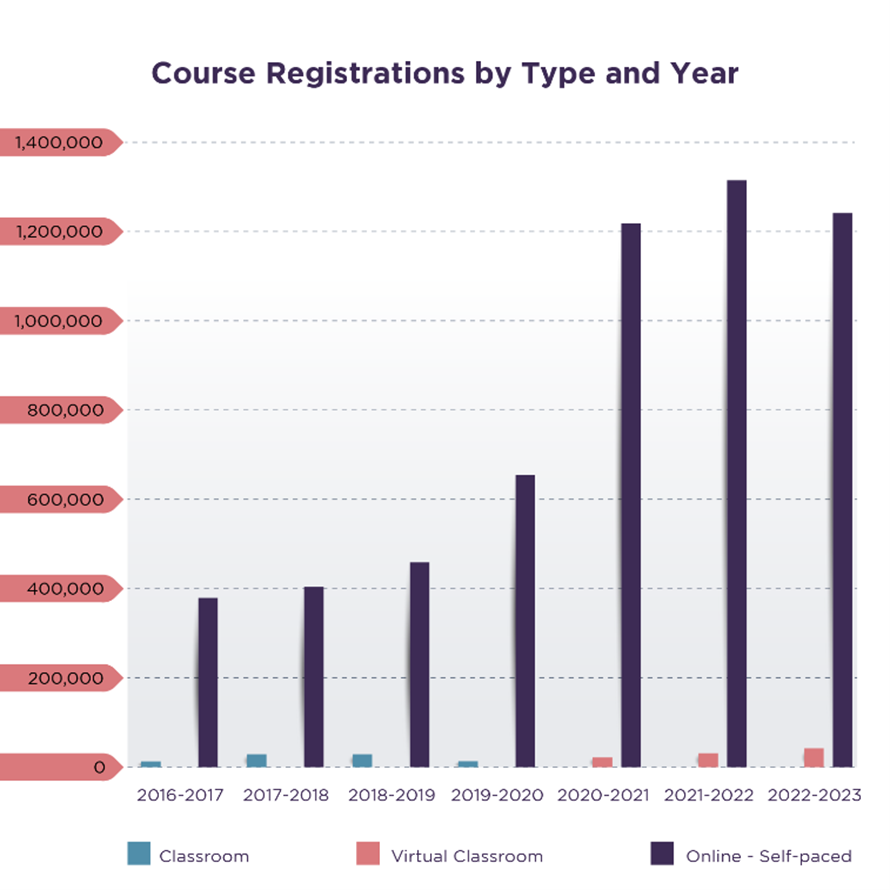
Text version
A bar graph compares course registrations between 2016 and 2023, with data broken down by year and type of course (classroom, virtual classroom, or online self-paced course). Registrations in online self-paced courses grew significantly in 2020. Virtual classroom registrations also grew in this time period over registrations for classroom-based courses. Classroom registrations were at 26,544 between 2016 and 2017, then at 30,226 in 2017 and 2018, at 30,870 in 2018 and 2019, then dropped to 9,578 between 2019 and 2020, down to 0 between 2020 and 2022, then up to 196 between 2022 to 2023. Virtual classroom registrations were at 1,327 between 2016 and 2017, then at 1,110 between 2017 and 2018, then at 1,598 between 2018 and 2019, growing to 4,654 in 2019 and 2020, then at 21,968 in 2020 to 2021, then at 23,980 in 2021 to 2022, and growing to 30,804 in 2022 to 2023. Online self-paced course registrations were at 374,310 between 2016 and 2017, 410,248 between 2017 and 2018, 463,499 between 2018 and 2019, 653,661 between 2019 and 2020, 1,220,779 between 2020 and 2021, 1,296,158 between 2021 and 2022, and at 1,254,255 between 2022 and 2023.
The COVID-19 pandemic required a pivot to provide learning for public servants who found themselves teleworking unexpectedly.
In 2020, more online learning products were made available to public servants and learning teams experimented with new methods of delivery (like micro-learning, podcasts, and interactive videos). The use of familiar formats, such as podcasts, YouTube videos, and mobile apps ensured easy access to relevant and readily available content for public servants.
Along with delivering the expected common curriculum, the School also developed new learning opportunities to build forward-looking skills and knowledge needed to respond to a changing world. Examples of learning content responding to issues that arose during the pandemic include:
- Responding to COVID-19: Job aids and videos on easing of COVID-19 restrictions in the workplace
- Supporting remote teams: Courses like Establishing Effective Virtual Teams, e-Mentoring, Leading Through Challenging Times, and the Going Remote series of guides
- Addressing anti-Black racism and unconscious bias: Courses and job aids on diversity and inclusion, anti-Black racism and being an ally, disaggregated data, and understanding and overcoming unconscious bias
- Digital government: Courses and job aids on Digital in the Canadian public service and the Discover Digital series, with specific courses on digital government, data, agile culture, cloud computing, and cyber security
- Mental health: Courses and job aids on supporting mental health during the pandemic, health and wellness strategies, psychologically healthy workplaces, and recognizing signs, symptoms, and solutions
- GBA Plus: The application of GBA Plus at each stage of the policy cycle
- Indigenous learning: Exploring the experiences, perspectives and diversity of First Nations, Inuit, and Métis in Canada
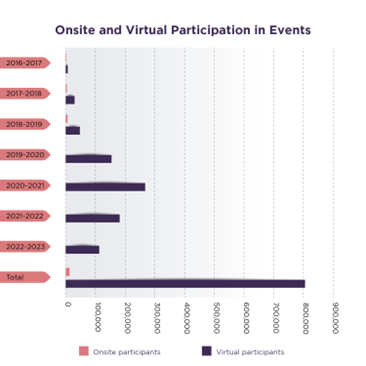
Text version
A bar graph shows an increase in participants attending virtual events compared with onsite events between the years of 2016 and 2023. For onsite participants, there were 6,087 in 2016 to 2017, 6,859 in 2017 to 2018, 9,406 in 2018 to 2019, 2,651 in 2019 to 2020, 0 in 2020 to 2021, 273 in 2021 to 2022, and 1,867 in 2022 to 2023. By contrast, participants for virtual events rose from 15,303 in 2016 to 2017, 34,128 in 2017 to 2018, 43,804 in 2018 to 2019, 155,777 in 2019 to 2020, 267,731 in 2020 to 2021, 175,068 in 2021 to 2022, and 120,708 in 2022 to 2023.
The business lines also hosted increasingly popular virtual events that have encouraged dialogue on current issues that governments are focused on, including on GBA Plus, anti-racism, Indigenous learning, becoming digital, and the virtual career boot camp.
The digital-first approach proved cost effective, supportive of the needs of an agile, inclusive and equipped public service, and allowed public servants to better connect with relevant learning content, particularly during a time when flexible online options were critical for the success of public servants. Further advancements in organizational operations have also contributed to data-informed decision-making in support of learners' needs.
Data-driven decision-making
Since the last reporting period, efforts have focused on using data to improve operations and programming. The School actively engages in:
- Data collection: automated collection of quantitative and qualitative data collected through the learning platform and automated surveys
- Data analytics: Through our data warehouse, business lines access common information and identify cross-cutting trends, while also being able to dive into specific products and their user's behaviours
- Business intelligence: Analysis of this data supports evidence-based decisions and informs the evolution of the strategic vision of the School
Collecting, analyzing and using data allows teams to quickly and thoroughly understand learners' needs and experiences so that practices and content can be refined in a timely manner.
Learning by doing
The School has adopted a learn-by-doing approach where learners work through real problems with the support of experts. This approach is known to be particularly effective for learners in terms of retaining knowledge, developing the skills necessary for success, and fostering connections.
Examples of learning-by-doing initiatives
Pathfinder projects were developed in collaboration with federal and provincial government partners to understand how novel technologies and methods can be used to advance public sector innovation and encourage solutions for core government functions, or to improve leadership skills. For example, the artificial intelligence (AI) and data demonstration projects, as well as proof-of-concept and discovery projects, were developed to identify and test novel applications of AI and data analytics in the Government of Canada and broadly share the lessons learned.
The Digital Accelerator program provided a transformational learning experience for teams transitioning to new digital ways of working. Through a combination of hands-on workshops, peer learning, and coaching and mentoring, participants applied their new-found skills in design thinking, user research, prototyping, product management, and agile principles to address a real business problem facing their organization.
A unique federal-provincial leadership program was piloted in partnership with the École nationale d'administration publique. This pilot paired new federal executives with their Quebec provincial counterparts in a French-only program that aimed to foster understanding and collaboration between the two levels of government, in addition to increasing leadership skillsets overall.
In addition, learning by doing projects designed to explore the feasibility of new technologies and data analytics techniques have provided public servants with skills to address complex horizontal issues. Recent projects have tested the use of immersive technology to develop virtual environments in support of change management initiatives, and AI-powered avatars to support the development of learning products.
Content excellence
The School places a strong emphasis on ensuring the excellence, relevance and timeliness of its learning content. Engagement, collaboration with subject matter experts, and community conversations are core activities prioritized in the development of learning materials to ensure they are informed by diverse viewpoints and the best available knowledge.
Engagement for learning products
Using the "Nothing about us, without us" principle, the School's learning priorities and products have been co-created with interdepartmental learning advisory committees that include people with lived experience. In order to identify training needs and develop learning programs, the School collaborated with organizations across the Government of Canada, and with Indigenous Peoples, academia, policy centres, international organizations and communities, functional communities, horizontal organizations, and other stakeholders. The continuous prioritization of collecting data on a wide range of views and perspectives ensures that learning priorities are well-informed and provide diverse learning experiences.
Connecting with leading thinkers
Learning products and events are also enriched by a broad range of thought leaders from across industry, the non-profit sector, academia, think tanks, and other governments engaged to inform, participate in, or co-deliver learning events, forums and conferences, courses, tools and dialogues.
For example, the School has launched:
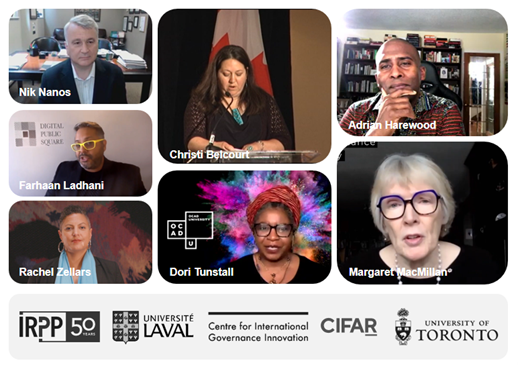
Text version
An image shows photographs of leading thinkers who have participated in School initiatives, as well as logos from key institutions the School has partnered with. The photographs of speakers show Nik Nanos, Christi Belcourt, Adrian Harewood, Farhaan Ladhani, Rachel Zellars, Dori Tunstall, and Magaret MacMillan. Logos from partner institutions are from IRPP, L'Université Laval, Centre for International Governance Innovation, CIFAR, and University of Toronto.
- An annual GC Data Conference in 2016 to enhance the capacity and skills of data practitioners and users throughout the federal government;
- A Diversity and Inclusion Conference in 2020 and 2021, in partnership with Statistics Canada, Canadian Heritage, and the Office of the Chief Human Resources Officer's Centre on Diversity and Inclusion;
- The annual Jocelyne Bourgon Visiting Scholar program, with the inaugural scholar Dr. Rachel Zellars (September 2021) who shared knowledge and expertise on topics such as unconscious bias and anti-Black racism through curriculum including facilitated courses and events.
Supporting community conversations
Interorganizational dialogues and conversations for groups of public servants provide communities with a way to learn and grow together. The School has been pleased to provide support to the:
- Federal Youth Network (from 2010 to 2022): Supports new and young public servants across Canada by fostering and promoting engagement, innovation and career development through a variety of programs.
- GC Data Community: Serves the growing community of data practitioners, leaders, and users across government. Established in partnership with departments and agencies, the GC Data Community convenes events, promotes learning and professional development, and undertakes special projects that help the Government of Canada to improve data-driven policy, programs and service delivery for Canadians.
- Innovation Hubs and Labs: Strengthens capacity across departments and agencies to use innovative approaches. Meet-ups connect public servants allowing individuals to share information (lessons learned, challenges, new practices, resources).
- National Managers Community: Promotes the needs and interests of managers and senior leaders. Supports managers from government organizations across Canada through learning and networking opportunities to strengthen engagement, capacity, and innovation.
- Recruitment of Policy Leaders (RPL): Recruits accomplished Canadians with the potential to lead positive change and make significant contributions to the federal public service and forms a pool of recruits for mid- to senior-level policy positions.
- Advanced Policy Analyst Program (APAP): A three-year professional and leadership recruitment and development program for economic and public policy analysts. It offers recent master's-level graduates an unparalleled opportunity for growth in the federal public service.
Into the future
Moving forward, each of the five business lines will continue to develop and deliver a common curriculum to support a modern, knowledgeable, skilled, and responsive federal government. The School will continue to leverage data to support evidence-based decision-making, prioritizing data literacy and the use of robust data applications across activities. Design and innovation learning will be embedded through the Digital Accelerator and curriculum, to align with the Government of Canada's Digital Standards for user-centric and iterative methodologies in the design of programs and services.
A culture of innovation in the Government of Canada will continue to be fostered through learning support on how to understand and apply rigorous experimentation in public servants' work. The principle of learning by doing will continue to be an important tool for deepening learners' knowledge. The sharing of innovative practices, both across government and with external partners, will aim to encourage novel solutions for core government functions, including in the areas of digital enablement, accessibility, and data sharing. The exploration of innovative solutions for learning and learning delivery, along with embracing new approaches, experiments, and semi-automated methods for producing high quality content, will ensure learning products remain relevant and useful over the coming years. Finally, community building and relationships with public administration researchers and experts across fields will remain central in how we equip public servants with the latest research and best practices.
Conclusion
The School is immensely proud of the work undertaken to transition to a modern education institution. The future promises to build upon this foundation to further position the organization as a world-class learning provider. We are excited to continue trialing new media and new formats, adapting as needs and technologies evolve, to excel in an ever-changing world. As we evolve, two key priorities will be to increase access to its learning products, while ensuring their accessibility for all learners.
With a dedication to adaption and innovation, the School will remain committed to empowering public servants with the knowledge and skills needed to serve Canadians amidst the complex realities of today and to be prepared for the challenges of tomorrow.
- Date modified: